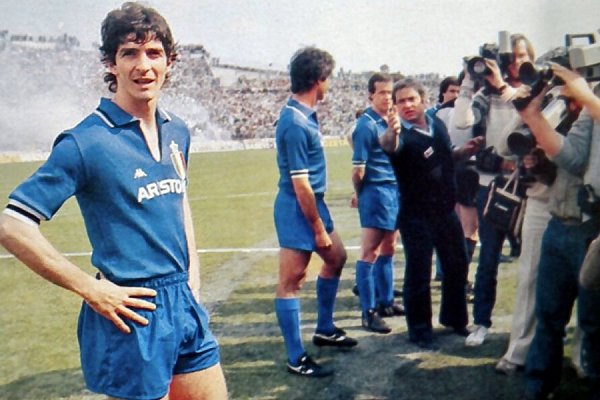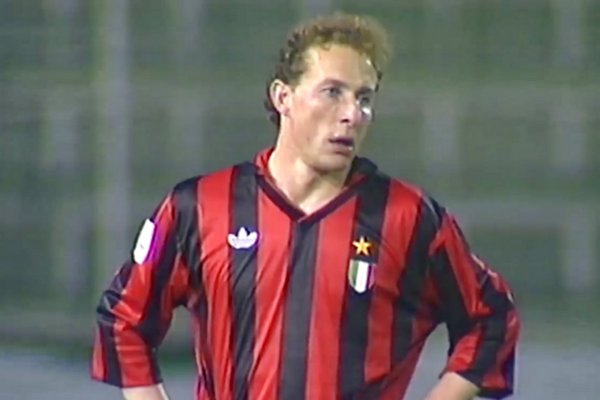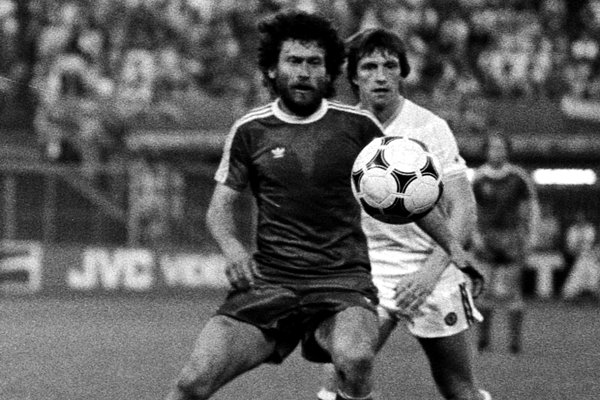Greatest German Footballers of all-time
As one of football's super-powers, it's no surprise to see such a great list of German footballers. No particular order, so don't get irate about it...
No.1 Franz Beckenbauer
Undoubtedly one of the greatest footballers of all-time, if ever a player's nickname suited him then it was "Der Kaiser" (the Emperor) because of his elegant, almost regal playing style, always composed, always looking like he was completely in control of things.
Beckenbauer started out as a midfielder but eventually moved back into defence, becoming one of the world's great sweepers. Beckenbauer literally won everything, from the Bundesliga to the European Cup, Intercontinental Cup, European Championship and World Cup. A phenomenal player.
No.2 Gerd Müller
The ultimate goal-poacher. Looking at the legendary Gerd Müller, with his short, stocky appearance, complete with enormous thighs, you wouldn't expect him to be particularly mobile, yet that was his main physical asset. His speed off the mark and over short distances, his lightning quick turns and movement, coupled with a natural instinct to be in the right place at the right time, made him football's greatest six-yard box predator. Müller was a phenomenal goal scorer - any time the ball was near him in the box it spelt danger. He seemed to score so many goals in the penalty area where he had his back to goal, spinning quickly to lose his marker and making an opportunity for himself, which more often than not he would score with.
During his fifteen years with Bayern Munich his scoring rate was incredible, he was the Bundesliga top scorer for seven seasons and nearly reached a ratio of a goal per game in over 600 matches for the Bavarian giants, helping them to four Bundesliga titles and three European Cup triumphs. His record at international level was even better, scoring 68 goals in 62 appearances, and he was a key part of the teams that won the 1972 European Championships and the 1974 World Cup. World Cup balls hitting the back of the net were his particular speciality - he scored 14 goals in just two tournaments, 1970 and 1974, which was a record until Ronaldo broke it in 2006.
Gerd Müller's Clubs: 1861 Nördlingen, Bayern Munich, Fort Lauderdale Strikers.
No.3 Lothar Matthäus
One of the greatest box-to-box midfielders that world football has seen, the energy, goals, dynamism and all-action style of Lothar Matthäus made him the first name on the team-sheet for many of his managers throughout the 1980s and 1990s.
Matthäus had a phenomenal international career with West Germany and then the unified German team. His career spanned twenty years, making his debut at the 1980 European Championships in Italy and playing his last game at the 2000 European Championships. In that time he made a record 150 appearances for the German national team, captained the side to World Cup glory in 1990 and also became the first ever outfield player to play in five consecutive World Cup tournaments; 1982, 1986, 1990, 1994, 1998.
No.4 Sepp Maier
A tremendous goalkeeper who literally won everything during his 18 years with Bayern Munich (he was a one-club man with the Bavarian giants) and 13 years with the West German national team, including the World Cup, the European Championship, three European Cup trophies and four Bundesliga titles.
Maier's great reflexes, speed and agility earned him the nickname "Die katze von Anzing" ("the cat from Anzing") but he was also incredibly consistent and dominant in the box in addition to his shot-stopping ability. His longevity was also incredible - he holds the record for consecutive Bundesliga matches - 442 from 1966-79.
Maier also became one of the most iconic keepers in football history with his trademark long shorts and being the first keeper to wear huge over-sized goalkeeper gloves. This image, along with his humour and personality made him a huge fan favourite throughout his career.
Sepp Maier's Clubs: Bayern Munich.
No.5 Berti Vogts
A huge favourite of German football in the late 1960s and throughout the 1970s, particularly with Borussia Mönchengladbach, with whom Vogts would spend his entire career as a one-club man, captaining the side through its glory period that saw him and the club win five Bundesliga titles and two UEFA Cup victories.
Playing as a right back, Vogts popularity was down to his tenacity and never-say-die attitude, his style earning him the nickname "de Terrier" (the Terrier). Never was this nickname more apparent than in the 1974 World Cup final between West Germany and Holland, Vogts given the task of man-marking the legendary Johan Cruyff. Despite getting a yellow card after only four minutes, and with the threat of a red then hanging over him for the remainder of the game, Vogts carried out the orders to perfection and is often cited as being one of the biggest influences on the outcome of the match, subduing Johan Cruyff as West Germany came from behind to lift the trophy.
Berti Vogts Clubs: Borussia Mönchengladbach
No.6 Paul Breitner
Breitner made his debut for Bayern Munich in 1970 and only a year later he was making his debut for the West German national team, aged only 19. Those early days saw him deployed as an attacking left back, given freedom to roam almost wherever he wanted.
By 1972 he'd already won a Bundesliga winners medal, and then a European Championship medal, playing left back as West Germany beat the Soviet Union 3:0. Breitner won the league again in 1973 and then had an incredible 1974, claiming another Bundesliga title, winning the European Cup after beating Atlético Madrid, and then being a key member of the West Germany side that lifted the World Cup on home soil, Breitner having a fantastic game at left back in the final, helping to thwart the Netherlands famous attacking threat and scoring the penalty that equalised the early Dutch opener.
At the 1982 World Cup Breitner scored again in the final, becoming only the third player to have scored in two different World Cup final matches, the others being Pelé and Vavá.
At club level he left Bayern Munich after the 1974 World Cup and signed for Real Madrid, playing at the Bernabéu for three seasons before heading back to the Bundesliga and a highly unexpected move to Eintracht Braunschweig, who, thanks to sponsors Jägermeister, were the only team who could afford the transfer fee and the wages.
No.7 Günter Netzer
Whilst West Germany had many world-class footballers in the 1960s and 1970s, they didn't have many like Günter Netzer. With his long hair, love for fast cars and a playboy image, he was a proper old-school maverick talent. It wasn't just image though, on the pitch he was the real deal, a gifted playmaker who starred as an attacking midfielder for his hometown club Borussia Mönchengladbach. Netzer's incredible passing, surging runs, and creativity in midfield helped establish Borussia Mönchengladbach as a real force in the Bundesliga, his goals and assists proving vital as the club won its first ever Bundesliga title in 1970 and then immediately followed it up with another.
Despite his fine club form, Netzer had missed out on West Germany's 1970 World Cup squad. However, two years later at the 1972 European Championships he would prove to be the national team's most influential player as West Germany won their first European Championship title. His form at club and international level resulted in a transfer to Real Madrid in 1973, a glamour signing that many believed was a response to Barcelona moving for Johan Cruyff. He would play at the Bernabeu for three seasons and win two la Liga titles.
Despite being part of the squad at the 1974 World Cup, Netzer's game-time was limited as coach Helmut Schön preferred to play Wolfgang Overath instead and felt like he couldn't accommodate two similar players.
No.8 Helmut Haller
One of the greatest German footballers of the 1960s, Haller was a wonderfully talented, charismatic player and a real extrovert off the pitch as well. He was renowned for his dribbling skills and his wonderfully inventive, imaginative passing, attributes that would see him played mainly as an attacking midfielder or a winger.
Haller was amongst the first German players to be lured to Italy to play in Serie A, Bologna sealing his transfer from hometown club Augsburg in 1962. It would prove to be a great move for the 22 year old, winning the Scudetto in 1964 before moving to Juventus and claiming another couple of titles. Incredibly, despite playing in Germany for 10 years either side of his Italian adventure, with Augsburg and BSV Schwenningen, Haller never played in the Bundesliga.
Haller was also famous as being the player who took home the World Cup ball in the 1966 final. Pictured receiving his medal from the Queen with the ball tucked under his arm, he claimed it was tradition in Germany that the player who scored the first goal would keep the ball. Thirty years later he gave the ball to Geoff Hurst, scorer of a hat-trick in the final, the tradition in English football being that the scorer of a hat-trick keeps the match ball.
No.9 Karl-Heinz Rummenigge
What a player. Rummenigge was often portrayed in the British media as "just" an out-and-out goal-scoring striker, albeit a very good one. However, there was a lot more to his game than that. He'd actually started out as a winger in his early days with Bayern Munich, his pace and dribbling ideally suited to the role. He also had great awareness and clever movement, meaning at times he could be used as a second striker or even an attacking midfielder.
As the years went on it was as a more central striking role for which he found fame, all of the attributes previously mentioned, along with his strength, heading ability and finishing made him one of the greatest forwards of the 1980s, backed up by his superb stats for the national team: 45 goals in 95 games.
Rummenigge spent ten years at 1. FC Köln before a big money move to Inter in 1984. Despite scoring 18 goals in each of his first two seasons, his time at the San Siro became beset with injuries, and he moved to Swiss club Servette in 1987 to see out the remainder of his career.
No.10 Andreas Brehme
No.11 Toni Schumacher
Whilst Schumacher will forever be remembered for the controversy surrounding his collision with French defender Patrick Battiston in the semi-final of the 1982 World Cup, it's still worth pointing out that he was a superb goalkeeper and widely regarded in the early 1980s as one of the world's best.
As well being a commanding presence and a great shot-stopper, Schumacher was a penalty specialist, in that infamous 1982 World Cup semi-final he saved two French penalty kicks in the shootout, and then four years later against Mexico he saved another two penalties in the quarter-final. In the Bundesliga, only Rudi Kargus, with 23, has saved more penalties than Schumacher's 18 saves.
Toni Schumacher's Clubs: 1. FC Köln, Schalke 04, Fenerbahçe, Bayern Munich, Borussia Dortmund.
No.12 Rudi Völler
Another in the long list of great German strikers, Völler was a fantastic penalty box player, coming alive in the box with his movement, finishing and positioning. And like any really top-class striker he was brave and fearless too, the sniff of a chance and Völler would be diving in to get there, particularly with his head as he was renowned for his diving headers. All these attributes made Völler a popular figure at most of the clubs he played for. He'd started out in the second division with Kickers Offenbach and 1860 Munich, but it's with Werder Bremen that he really became a household name, scoring 97 goals in 137 Bundesliga games for Die Grün-Weißen and sealing a move to Roma in 1997. Völlerdidn't score at quite the same rate in Serie A bit was still a huge favourite with the Giallorossi fans. After five years in Rome he would head off to Marseille where he would help the club achieve their European dream, winning the inaugural Champions League in 1993.
Völler also had a great record at international level, scoring 47 goals in 90 appearances, and playing up front with Jürgen Klinsmann in the 1990 World Cup as they won their third title.
No.13 Bernd Schuster
The intricacies of Schuster's career, the ups and downs, and all of the controversies, are much too complicated to explain here, but he managed to forge a fantastic career in Spain as a true midfield general, directing attacking moves with his fantastic passing and vision. It's just a real shame that we weren't able to see more of his skills on the biggest global stages.
No.14 Pierre Littbarski
Equally dangerous as an attacking midfielder or as a winger, Littbarski was a joy to watch - a fantastic dribbler, slipping passed defenders with the socks rolled down on his bow legs. He first came to prominence at the 1982 World Cup, where he was one of the tournament's standout players, certainly West Germany's most creative player, and ended up with more assists than any other player at the tournament.
Apart from a brief sojourn in France with the Racing Club Paris project, and an end-of-career adventure in Japan, Littbarski played his entire Bundesliga career at 1. FC Köln. Whilst he was widely loved in Germany for his playing style and his humour, when it came to winning trophies the cupboard was pretty much bare in comparison to some of the other great Germans in the 1980s who'd played for rival clubs or gone abroad. As he reached his 30th birthday in April 1990 he'd only won a single trophy, the DFB-Pokal (German Cup), so it was fitting that by the end of that summer he was rewarded with the biggest honour of them all - a World Cup winners medal.
No.15 Manni Kaltz
One of the greatest right-backs of the 970s and 1980s, Manni Kaltz was known for his attacking style of play and was considered one of the best attacking full-backs of his time. Kaltz was an excellent crosser of the ball and had a powerful shot, which made him a dangerous threat going forward. He was also extremely solid defensively, with good positioning and tackling ability, which made him an important player for both his club team, Hamburger SV, and the West German national team.
No.16 Uli Hoeneß
Lightning fast forward who had an incredible start to his career with Bayern Munich and West Germany, winning the World Cup, European Championships, Bundesliga and European Cup by the age of only 22! In these early years, Hoeness was considered one of the most dangerous forwards in European football, and he didn't just operate alone, forming one of the 1970s greatest partnerships alongside the legendary Gerd Muller. The natural goalscoring ability of Muller, coupled with the incredible pace of Hoeness, proved a deadly combination. And when we say pace, we mean it, for years he was widely considered the fastest forward in Europe alongside Russian flyer Oleg Blochin. Unfortunately, the latter end of his career wouldn't go as well, and Hoeness would have to retire from the game because of injury aged only 27.
No.17 Guido Buchwald
Terrific defender of the 1980s and 1990s, probably one of the most underrated German players of the era. Guido Buchwald's commanding presence in defence, leadership skills, and impressive performances on the international stage made him a feared opponent for attacking players of the era.
No.18 Sebastian Deisler
A gifted midfielder whose career was sadly hampered and the cut short by serious knee injuries, Deisler had been hailed as the most talented German of his generation when he burst onto the scene with Borussia Monchengladbach in 1999. With fantastic footwork and wonderful passing, Deisler was equally at home as an attacking playmaker or a right-sided midfielder, and a move to ambitious Hertha Berlin would quickly follow. He would stay three years in the capital before a move to Bayern Munich. Unfortunately, Deisler would manage only 62 appearances during his five seasons with the Bavarian giants - constant problems with his knee injury and a lack of confidence in its stability meant that, sadly, he would retire from the game aged only 27.
No.28 Oliver Bierhoff
Standing at an imposing height of 6 feet 4 inches, Oliver Bierhoff was a dominant presence in the penalty area and was renowned for his aerial prowess and goal-scoring ability. He was known for his intelligent positioning, making well-timed runs and using his height and strength to win headers and score goals. Bierhoff was also adept at holding up the ball and bringing his teammates into play, displaying good link-up play. His goal-scoring instincts and physicality made him a potent threat in front of the net throughout his career.
No.29 Olaf Thon
Olaf Thon was a German footballer known for his technical skills, versatility, and tactical intelligence on the field. He was primarily a midfielder but could adapt to various positions, including central midfield, attacking midfield, and even as a full-back. Thon had excellent passing ability and vision, often dictating the tempo of the game and initiating attacks with his accurate distribution. He possessed great ball control and was known for his precise long-range shots. Thon's ability to read the game and make intelligent decisions made him a reliable and influential player throughout his career.
Tweet



